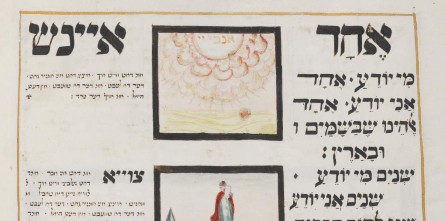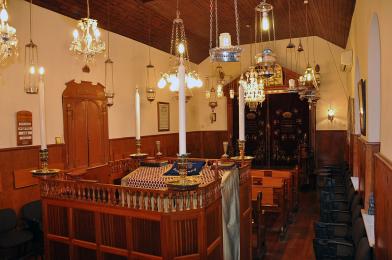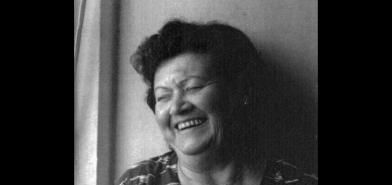Arabic version of “Ehad mi yode’a” by Rabbi Levy Itzhak recorded by Avigdor Herzog and Ephraim Yaacov (1987)
An Ashkenazi version of “Ehad mi yode’a” in…Arabic
Cleaning up my office desk towards Passover 5783 (2023) I found a note that Mr. Moshe Goelman from Jerusalem sent me around 2007 or 2008. He wrote at that time:
“A few days ago, we spoke over the phone about ‘Ehad mi yode’a’ in Aramaic. I am interested in the origins of the tune. The song is known to me from my childhood because my father sang it every Seder night. My father learned it in his childhood in Poland. I do not know from whom he heard it. The text and the tune I recorded a few years ago at the Phonoteque [Sound Archive] of the National Library. The opening words of the song are ‘Ehad manda’i’. The tune sounds to me Oriental. A few years ago, I heard the song ‘Ehad mi yode’a’ in the Arabic language with the same tune. The person who performed the song could not provide details about the tune. I will be glad if you can listen to the recording at the Phonoteque and of course I will be glad to hear if you have a suggestion regarding the origin of the tune and how it made its way to Poland.”
As with many queries of this kind that arrive to my desk, this one too remained unanswered. In the meantime, our website team produced back in 2015 a substantial entry on “Ehad mi yode’a” and the time is ripe now to provide a sequel that will honor, even if with a remarkable delay, the inquiry of Mr. Goelman. Here is the excerpt of his recording with Yaakov Mazor, carried out on July 15, 1999.
“Ehad mi yode’a” by Moshe Goelman, recorded by Yaakov Mazor (1999)
Mr. Goelman (b. 1930 in Buenos Aires), scion to a family from Stawiski (northeast Poland, near Bialystok), refers in this excerpt to his family’s Passover tradition that included an Aramaic version of “Ehad mi yode’a.” His father and uncle used to sing this version already in Poland in the 1920s. Goelman also relates about his discovery, after immigrating to Israel, that the tune he knew was similar to a Judeo-Arabic version he heard from a colleague of his in the Israeli educational system. He indeed agrees that the tune he sings bears Mizrahi (Oriental) or Arabic elements.
Unlike few other Aramaic versions available to us, the refrain that Goelman sings (Allah, Allah, Allah Allah hu) corresponds to the Judeo-Arabic version from Baghdad (see below). These puzzling details led to the discovery of more than one Ashkenazi testimony regarding the performance in Arabic (and/or Aramaic) of this favorite number sung after the Passover Seder meal whose most widespread version already includes a linguistic ambivalence, as it mixes Hebrew with Aramaic.
Without addressing anew the diverse hypotheses regarding the origins and circulation of “Ehad mi yode’a” throughout the Jewish world (including the question of whether it was originally intended for the Haggadah or not) discussed in our earlier entry on this song, I suggest considering linguistic ambivalence as a venue for the clarification of the making of this song. Translating the beloved Passover folksongs added to the Haggadah sometime during the late medieval period to vernacular languages is indeed a common practice. However, the existence of fully Aramaic versions deserves attention because it pairs the song with its counterpart “Had gadya” linguistically.
Moreover, the mixture of Aramaic and Arabic in Goelman’s version, added to the evidence of the singing of an Arabic version by Ashkenazim opens interesting questions. Far from claiming that the original “Aramaized” Hebrew version customary today is not the original one, scholars should at least raise the possibility that a fully Aramaic version circulated parallel to it. Moreover, perhaps the Arabic versions of our song derived from an Aramaic rather than from the Hebrew one.
A brief search online led to a forum that discussed the phenomenon of “Ehad mi yode’a” in Arabic. One of the participants in this online thread has this to say: “My grandfather and father sang the last section of the end of the Haggadah in Arabic…and they were Hassidic Ashkenazi Jews born in Israel. This means that Goelman’s inquiry had a stronger resonance in ethnographic data.
Aramaic versions of “Ehad mi yode’a”
Two Aramaic versions from Ashkenazi sources follow here. The first one is by R. Yonatan Shtencel, who in the introduction to the recording of his arranged version claims that the Aramaic version was sung in his family (originating in Kishinev, Moldavia) for generations.
Here is the text of this Aramaic version, very similar to Goelman but with a different refrain and tune.
חד מה יודא חד מה יודא,? חד חד אנו יודא אנו יודא! טרלאלאלאלאלאלאלא......
חד אלוקא, אלוקא, מרן די בשמיא וארעא - מרן די בשמייא וארעא
תליסר תליסר אנו יודא אנו יודא! טרלאלאלאלאלאלאלא......
תליסר מידה-תא
תריסר שבטיא
חד סר כוכבתא
עשר דיברתא
תשע ירחתא
תמניא ימי מלא-טא
שבע ימי שבתא
שיתא מישנתא
חמשא חומשתא
ארבע אימא-תא
תלת אבה-תא
תרי לוחתא
חד אלוקא, אלוקא, מרן די בשמיא וארעא - מרן די בשמייא וארעא
A second Aramaic version was provided by the family of Uzi and Aya Herling. According to their recorded testimony, this was the tradition of their grandfather, R. Moshe Hersh, a Chabad hasid. Here follows this family recording carried out live during the Passover Seder in 2004. What is striking in this version, is that the number “two” is “Moses and Aharon” as in all the Arabic versions (see below; notably this variant recurs also in the Judeo-Spanish versions) and not “luhot ha-berit” (Tablets of the Covenant”) as in the customary Hebrew/Aramaic version (or the version by R. Shtencel above).
Aramaic recording by the family of Uzi and Aya Herling (2004, NLI sound archive)
Arabic versions of the Arab-speaking Jews
Several Judeo-Arabic versions are extant in sharqi (Oriental) and maghrebi (Occidental) versions. The following remarks refer to the two main sharqi versions documented musically, the ones from the ancient cities of Aleppo (Syria) and Baghdad (Iraq). The Arabic versions open “Min ye’elam umin yidri?” (“Who will know and who will understand”) or “Wahad min ye’elam? Wahad min yidri?” (“Who who knows? One who understands?”) that parallel the Judeo- Spanish, “Ken supiense y entendiense” (see our earlier Song of the Month)
The following version of “Ehad mi yode’a” in Arabic from Aleppo was recorded during a live reconstruction of the Seder meal by the Harari and Yedid families. It was recorded by Kol Israel (Radio Israel) in the framework of the documenting of Seder traditions of all Jewish communities initiated by the legendary producer Yossef Ben Israel.
Harari and Yedid family Aleppo (Kol Israel CD-05002_7M133)
This version is widespread through the Aleppo Jewish diaspora in the Americas, as the follow testimonies assert. First, the following video recorded at the Talmud Torah of the Aleppo Jewish community in Mexico became viral online:
Here follow three other recordings of the Aleppo version by prominent cantors from the Aleppine communities in Latin America:
Hazzan Jack Abadi
Hakham Eli Abadi
Daniel Binker Dwek, Buenos Aires
This is the Aleppo version of the text:
מִן יִעְלַם וּמִן יִדְרִי אללה רַבּ אִלמוּתְגַּ'לִּי,
אינווה אִל וּאָחֵד?
וּאָחֵד רַבּ אִלְכָאלִאְנָא . אללה הוּא וּאָחֵד:
איננן אֵל תְלַתָּאעַשׁ?
תְלַתָּאעַשׁ לִּבְּס אִל תְּפִלִּין,
אִתְנָּאעַשׁ שֵׁבֵט יִשְׂרָאֶל,
אִדָאעַשׁ כָּוּכָּב אִלְסַּמַא,
עַשַׁר כִּלְמָאת אִל תּוֹרָה,
תִסְעַת אִשְׁהוֹר אִל חִבְּלֵה,
תְּמֶאנְת אִיָּאם אִל מִילַה,
סַבְעַת אִיָּאם אִל חוּפָּה,
סִּתּ סַדַאדֵיר אִל מִשְׁנָה,
כַמְס מַצָאחֵף אִל תּוֹרָה,
אַרְבַּעַה אִמָּאתְנָא,
ווּתְלַאתֶּה אַבָּאתְנָא,
תְּנֵין מוּסָה וּאַהָרוּן,
וּאָחֵד רַבּ אִלְכָאלִאְנָא. אללה הוּא וּאָחֵד:
The second sharqi version, the one from Baghdad, is performed here by Hazzan David Huri (a most distinguished cantor from Baghdad who immigrated to Jerusalem) and friends. Edith Gerson Kiwi recorded Huri on November 11, 1959. His version is unique in that he sings fifteen numbers and not thirteen as customary.
The sharqi version of “Ehad mi yode’a” performed Hazzan David Huri
Rabbi David Menachem of Jerusalem, a scion to a rabbinical family from Baghdad, offers in the following video a succinct explanation about the origins of song (including the varying numbers). He performs the Baghdad version with a tune very similar to David Huri’s:
Here is the text of the Baghdad version:
ווַאחַד מִין יִעְלַם? ווַאחַד מִין יִידְרִי?
ווַאחַד רַבּוּן חַ'אלִיקְנַא
אַלְלַה הוּא, אַלְלַה הוּא, אַלְלַה אִילַּה הוּא.
תְּלַתַּעְשַׂר מִין יִעְלַם? תְּלַתַּעְשַׂר מִין יִידְרִי?
תְּלַתַּעְשַׂר טּורוּקּ אֶ(לְ)תַּפְסִיר
תְּנַעְשַׂר אַשְׁהוּר אֶל סַנַּא
חְדַעְשַׂר כַּאוּכַּבְּ פִי סַמַא
עַשַׂר ווַאסַיַה אֶל עַשַׂר
תִּשְׂעַה אַשְׁהוּר אֶל חִיבְּלַה
תַּמַּן אַיַאם אֶל טוּהוּר
שַׂבַּע אַיַאם אֶל אוּסְבּוּעְ
סִיתַּא כּוּתּוּב אֶלְמִישְנַה
חַמֵס אַסְפַר מוּסַא אֶלְחַמְסַא
אַרְבַּע אִימַאתְּנַא
תַּלַתֵּא אַבַאתִּינַא
תנֵין מּוסַא ווַאהַרוּן
ווַאחַד רַבּוּן חַ'אלִיקְנַא
אַלְלַה הוּא, אַלְלַה הוּא, אַלְלַה אִילַּה הוּא!
To briefly illustrate one of the North African versions of “Ehad mi yode’a” in Judeo-Arabic, here is the one by Amos Hagag from Libya:
“Ehad mi yode’a” by Amos Hagag
Ashkenazim singing “Ehad mi yode’a” in Arabic
To end of this Song of the Month we return to the presence of “Ehad mi yode’a” in Arabic (and/or Aramaic) among Ashkenazim by inquiring about the origins of this phenomenon. I suggest that the encounter of Ashkenazi Jews with their brethren from the lands of Islam in Palestine had musical ramifications that are still to be studied. The presence of Arabic and entire Aramaic versions of “Ehad mi yode’a” among Ashkenazi Jews is therefore one example of such intra-Jewish multicultural encounter.
As we have seen in the opening recording of this Song of the Month, Moshe Goelman’s version merged Aramaic and Arabic, tracing this version back to his father in Poland. We may hypothesize that he was combining his father’s Aramaic version which, as we have seen, is documented among Eastern European Jews, and the Arabic refrain of the Baghdadi version which he probably heard in Israel.
Other recorded documents of the Arab version among members of the Yishuv in Palestine corroborate its circulation there in the 1930s. One of the recordings that caught my attention many years ago was one by Miriam (Bat Abraham) Levitin (1908-1998) of Kfar Giladi, one of the most gifted and prolific singers we encountered in the ethnography of the modern Hebrew song repertoire in Israel. Levitin, was recorded singing “Ehad mi yode’a” in Arabic, a language she commanded, in the mid-1960s. She sings a version very close to the Baghdad one that she learned according to her own testimony “forty years ago,” i.e. late 1920s or early 1930s. A copy of this recording from the Kfar Giladi archive that was dated in 1979 was donated to the Sound Archive of the National Library in 1990.
Ehad mi yode’a in Arabic by Miriam Levitin
Another gifted Eretz-Israeli folk singer, Arie Uri (1924-1992) from kibbutz Ma’agan Mikhael who was educated in Jerusalem in the late 1930s, recalled an anecdote related to “Ehad mi yode’a” in Arabic that Yaacov Mazor recorded on October 19, 1991. Uri related that the famous American Jewish educator, Dr. Alexander M. Dushkin (1890-1976), once entered his classroom in Jerusalem substituting for another teacher and taught the song that Uri recalled very fragmentarily but whose melody is identical to the one by Levitin. Dr. Dushkin sojourned to Jerusalem in 1934 and that was probably the date of this classroom encounter. Where, when and from whom this Polish-American Jew could have learned such a song in Arabic ? Perhaps he became acquainted with it during his earlier stay in Palestine in 1920-1921 (see Dushkin’s memoire, “An American in Palestine After the Balfour Declaration, Jewish Education, 41:1-2 [1971], 13-25).
Arie Uri speaks about the recording 'Ehad mi yode’a” in Arabic
A most remarkable Arabic version of “Ehad mi yodea’s” is the one transmitted by Rabbi Levy Itzhak ben Pinchas David Horowitz, the Rebbe of Boston (1921-2009) and recorded by Avigdor Herzog and Ephraim Yaacov on August 13, 1987. Although in the recording the Rebbe does not specify from whom he learned this version, it makes sense that this was the tradition of his father (as he testifies regarding other sections of the Haggadah), the first Bostoner Rebbe, R. Pinchas David Horowitz (1877-1941) who was born and raised in Ottoman Palestine living there until the age of 37 (1914). R. Levy Itzhak’s version bears textual similarities to the Baghdad version as do Levitin and Uri’s versions.
Arabic version of “Ehad mi yode’a” by Rabbi Levy Itzhak (1987)
The present article hardly scratches the surface of what can be said about the linguistic ambivalence of “Ehad mi yode’a.” It speaks however scores about the vitality of oral traditions and the intimacy of single family memories. Hopefully further research will expand more on these findings.

Detail from the Leipnik Haggadah, Amsterdam, 1738. Biblioteca Rosenthaliana, Ms. HS.ROS 382, fol. 28b.







